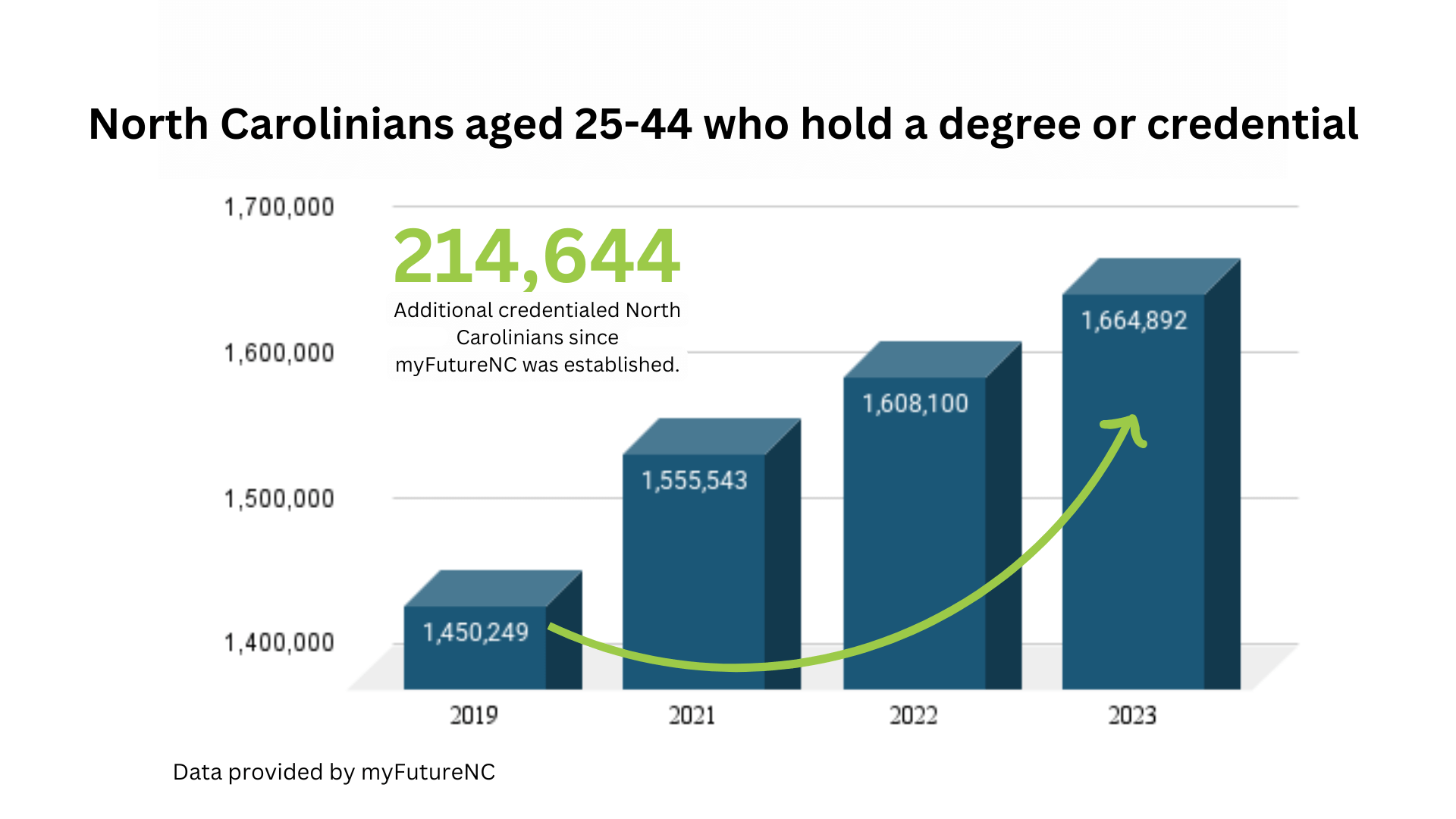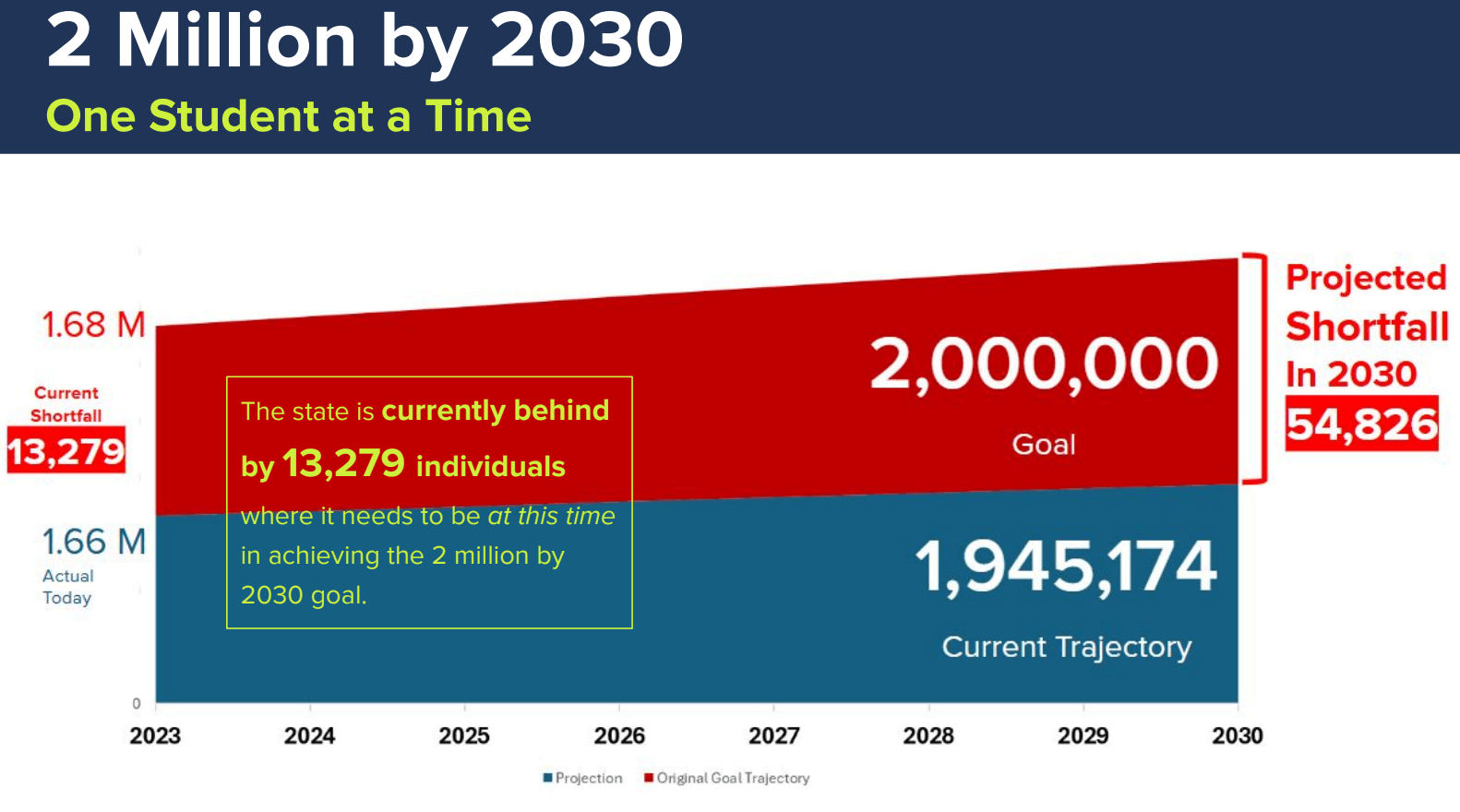RALEIGH (February 21, 2025) – North Carolina set an ambitious goal in 2019 to have 2 million citizens ages 25-44 with high-quality credentials or postsecondary degrees by 2030.
Several years in – and after a global pandemic and severe flooding in western North Carolina – we’re behind on reaching that goal. But not as behind as we were a year ago.
Officials with myFutureNC announced Thursday that the state has 1,664,892 North Carolinians in that age group with credentials or degrees – the state has added 214,644, or 15%, since 2019.
While this is significant progress, the state is still projected to fall short by 55,000 by 2030. But this shows a relative gain versus last year, when North Carolina was projected to fall short by 72,000 – and 2019, when it was projected to fall short by 400,000.
“EDUCATION IS economic development,” said Cecilia Holden, the President and CEO of myFutureNC, who noted that the state’s economy is booming despite the tragedies of recent years.
“So this goal of 2 million by 2030 is incredibly important in preparing our current and our future workforce and in meeting the growing needs of employers all across the state,” she said.
The state is importing talent through educated people who continue to move to the state, but it is also educating homegrown talent at a higher rate, Holden said.
Still, just 31%, or one in three, of today’s 9th-graders are projected to earn a credential or college degree, she said, even though two-thirds of today’s jobs require education beyond high school.
At the current rate, Holden said, the state is tracking 13,000 behind where it needs to be at this point to meet the 2 million goal by 2030.
“Bridging the gap is more important than ever,” she said.
HELP TOWARD a degree or credential can take many forms. MyFutureNC highlighted a variety of programs that help students and adult learners get it done, including:
•Aspire Appalachian at Appalachian State University, which helps community college graduates make the transition to a four-year college.
“Just knowing that there was someone here at App who was looking out for me and wanting the best for me was everything if needed in the moment,” said Christina Winter, a 2022 App State graduate.
•The Wayne County Reentry Council at Wayne Community College, which works with former inmates to help them secure job skills and reduce a 48% recidivism rate in North Carolina.
“It really has been a 360 for me,” said a tearful Rashema Bivens, 41. “Since I was 11 years old, I’ve never been out of prison this long.”
Now a certified peer support specialist at the college, she says she gets to work with people who come from the same background she did. “I get to show them, ‘Hey, we can turn this around,’” she said.
•The Campbell University Second Chance Initiative, another re-entry program.
“They see in us what maybe others would never have seen because they never took the time to really learn who we were,” said Wesley Lee, a 2021 Campbell grad.
INCREASING COMPLETION also requires help from state legislators. Holden outlined three broad points of emphasis in myFutureNC’s legislative agenda this year:
•Focus on Early Education: This includes expansion of NC Pre-K and an emphasis on the Science of Reading from pre-school through middle school.
•Increase Adult Enrollment and Completion: 300,000 North Carolinians have some college, but no degree. Helping these would-be students would include:
o $10 million in state aid for students pursuing industry credentials but who do not qualify for Pell Grants;
o $8.5 million for the UNC System’s Completion Assistance Grants to help students who face sudden financial hardship that places them at risk of dropping out; and
o $5-7 million to expand the state’s common digital transcript and make it easier to transfer course credits.
•Align Education with Workforce Needs: This includes:
o Support for the NC Community College System’s Propel NC initiative;
o Scholarships for training in high-demand jobs that don’t require a degree, such as the trades; and
o $5 million to support local cross-sector collaboratives that focus on alignment between education and workforce development.
Meeting the goal is non-negotiable if North Carolina wants to take back its No. 1 spot as America’s Top State for Business.
Will the General Assembly step up to support these initiatives and help to ensure employers have the talent our employers need? We’ll see as legislators prepare a new state budget.



Leave a Reply